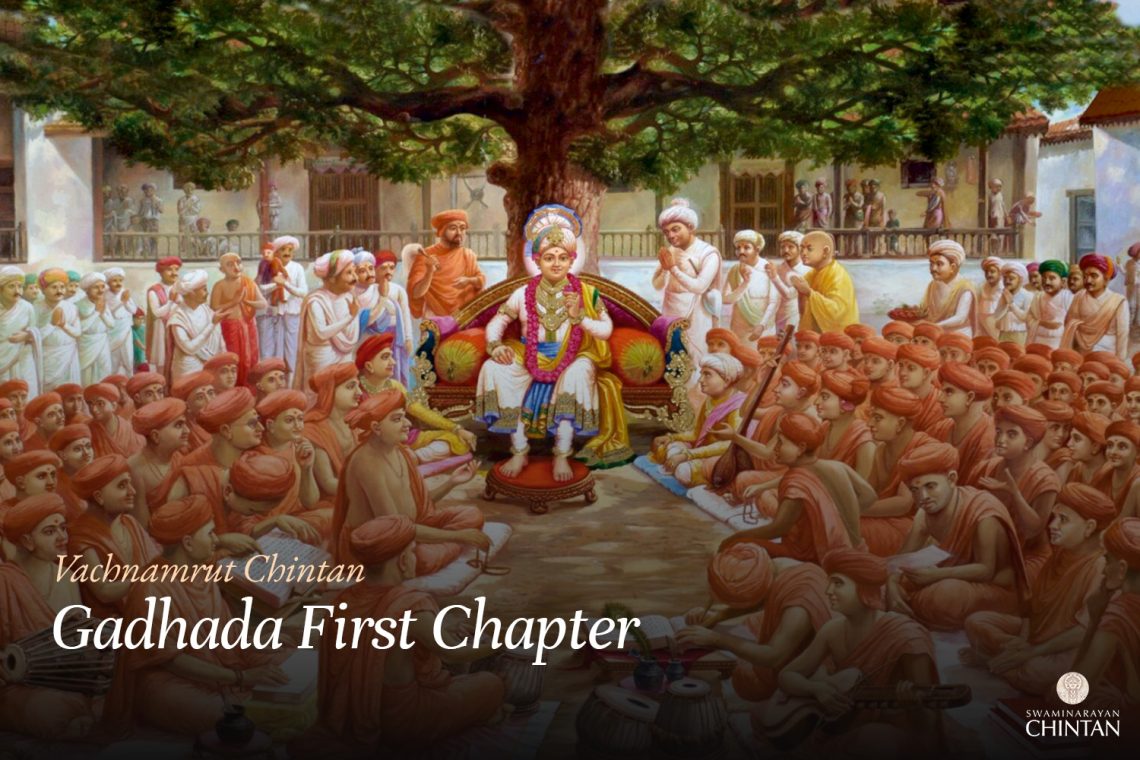Central Insights:
- Explanation and renunciation of the four types of Kusangi.
Key Points:
- External kusang nourishing internal conflicts.
- Internal kusang cannot thrive without the co-operation of external kusang.
- To renounce the above mentioned kusang.
- To avoid them, pray daily to Maharaj.
Explanation
In this Vachanamrut, Maharaj gracefully said that a devotee of Bhagavan daily after worshipping, and praising should seek that, ‘O Maharaj! please protect me from kusangi.’ There are four types of Kusangi. First one is Kudapanthi, second Shushkvedanti, third Shaktipanthi, fourth Nastik. In the path of Salvation, one’s inherent defects cannot be disruptive as much as kusang can be. In the path of Salvation, one’s own virtues cannot be helpful as much as Satsang can be. Satsang is the originator of Bhakti, however, it is not said that Bhakti is the originator of Satsang. It is the same for all virtues i.e Dharma, Gyan, Vairagya etc. Therefore, one must be afraid of Kusang.
Māharāj says, to pray on bhagavan. In this also, it is strange that the external kusang itself cannot act, but the kusang within ourselves is activated through its influence. If the kusang within oneself does not offer support to the external kusang, then it cannot do anything. However, the compulsion is there that we hardly look at our internal weakness. Since we cannot do that much, Maharaj says that at least we stay away from external kusang so internal kusang also cannot act. Furthermore, Māharāj says that even within the heart of Jiva, there is both a saint and a kusangi holding their weapons. However, they can only be influenced by respective externals. Therefore, four types of kusang only act with the help of inner kusang.
The term Kuda in ‘Kudapanthi’ implies that ‘born out of adultery’. The meaning of Kudapanth is, a group that gives preference to adultery only. It is only used to provoke the lust staying inside the heart of Jiva. That deviates one from the path of salvation. Whereas, ‘Shaktipanthi’ seduces one to eat meat and drink alcohol that corrupts one from Vartaman. It deviates one from the purity. The one whose control over taste is strayed, cannot stand the prohibition of eating something (accepted by scriptures) and not eating something (denied by scriptures). Then how come purity can be kept! Thus, it also deviates one from the path of salvation. Third is ‘Shushkvedanti’ — this class of kusang removes the Swami-Sevak attitude. This category of people considers themselves as a Bhagavan. And ‘Nastik’ considers Bhagavan as false. According to their principles, there is no one controller of this universe — Bhagavan. Therefore, by disproving the determination (‘Nishchaya’) of Bhagavan, they deviate one from the path of salvation.
Thus, the former two kusang, connect one to inner-enemy (‘Antahshatru’). Whereas, later two disconnect the relation from Bhagavan. All of them deviate one from the path of salvation. Thus, these four kusang are the most dominant among others.
One must try to escape from these four kusang. For that purpose, Maharaj told us to pray to Bhagavan. There is a strange relation between inner kusang and external kusang. Without the support of inner kusang, external Kusang cannot succeed alone. On the other hand, without the support of external kusang, inner kusang cannot move on, or cannot become stronger. Therefore, if the unity-contact-consonance of both is avoided, they do not obstruct the path of salvation easily.
In reality, something that stimulates the inner-enemies and disconnects the relationship with Bhagavan is kusang. And a place where inner-enemies are ripped out is satsang. The four types of kusang mentioned in this vachanamrut by Maharaj also acts as described above. Means, they stimulate inner-enemies and disconnect the relationship with Bhagavan. Thus, Maharaj says to stay away and be afraid of them. However, the strangeness of this world is that it stays away and afraids of satsang. This Jiva escapes from the place where inner-enemies are disproved. Bhagavan does not need to give sermons on it, and Jivas of this world run to a place where inner-enemies are nourished. Therefore, Maharaj says that one who wants salvation should run like ordinary Jivas but should renounce them. One must be afraid of kusang and connect strongly with satsang.
Glossary
| Antahshatru – Inner enemies such as lust, anger, greed, attachment, and ego. |
| External Kusang – Negative associations or influences from the external world. |
| Inner Kusang – Negative tendencies or inner enemies residing within the heart. |
| Kudapanthi – A sect or group promoting adultery and lust. |
| Nastik – Atheists who deny the existence of Bhagwan (God). |
| Nishchaya – Firm faith in God. |
| Satsang – Holy fellowship or association that nurtures spiritual virtues. |
| Shaktipanthi – A sect promoting meat consumption and alcohol. |
| Shushkvedanti – Dry philosophers who reject the Swami-Sevak relationship with God. |
| Vartaman – Moral and spiritual discipline. |
| Vrutti – The mental focus or tendency of the mind. |

